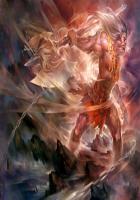The sympathetic attraction, which causes us to associate, is, by reason of its blind, unruly nature, always governed by temporary impulse, without regard to higher rights, and without distinction of merit or priority.The bastard dog follows indifferently all who call it; the suckling child regards every man as its father and every woman as its nurse; every living creature, when deprived of the society of animals of its species, seeks companionship in its solitude.This fundamental characteristic of the social instinct renders intolerable and even hateful the friendship of frivolous persons, liable to be infatuated with every new face, accommodating to all whether good or bad, and ready to sacrifice, for a passing liaison, the oldest and most honorable affections.The fault of such beings is not in the heart--it is in the judgment.Sociability, in this degree, is a sort of magnetism awakened in us by the contemplation of a being similar to ourselves, but which never goes beyond the person who feels it; it may be reciprocated, but not communicated.Love, benevolence, pity, sympathy, call it what you will, there is nothing in it which deserves esteem,--nothing which lifts man above the beast.
The second degree of sociability is justice, which may be defined as the RECOGNITION OF THE EQUALITY BETWEEN ANOTHER'S PERSONALITYAND OUR OWN.The sentiment of justice we share with the animals; we alone can form an exact idea of it; but our idea, as has been said already, does not change its nature.We shall soon see how man rises to a third degree of sociability which the animals are incapable of reaching.But I must first prove by metaphysics that SOCIETY, JUSTICE, and EQUALITY, are three equivalent terms,--three expressions meaning the same thing,--whose mutual conversion is always allowable.
If, amid the confusion of a shipwreck, having escaped in a boat with some provisions, I see a man struggling with the waves, am Ibound to go to his assistance? Yes, I am bound under penalty of being adjudged guilty of murder and treason against society.
But am I also bound to share with him my provisions?
To settle this question, we must change the phraseology.If society is binding on the boat, is it also binding on the provisions? Undoubtedly.The duty of an associate is absolute.
Man's occupancy succeeds his social nature, and is subordinate to it; possession can become exclusive only when permission to occupy is granted to all alike.That which in this instance obscures our duty is our power of foresight, which, causing us to fear an eventual danger, impels us to usurpation, and makes us robbers and murderers.Animals do not calculate the duty of instinct any more than the disadvantages resulting to those who exercise it; it would be strange if the intellect of man--the most sociable of animals--should lead him to disobey the law.
He betrays society who attempts to use it only for his own advantage; better that God should deprive us of prudence, if it is to serve as the tool of our selfishness.
"What!" you will say, "must I share my bread, the bread which Ihave earned and which belongs to me, with the stranger whom I do not know; whom I may never see again, and who, perhaps, will reward me with ingratitude? If we had earned this bread together, if this man had done something to obtain it, he might demand his share, since his co-operation would entitle him to it;but as it is, what claim has he on me? We have not produced together--we shall not eat together."The fallacy in this argument lies in the false supposition, that each producer is not necessarily associated with every other producer.
When two or more individuals have regularly organized a society,--when the contracts have been agreed upon, drafted, and signed,--there is no difficulty about the future.Everybody knows that when two men associate--for instance--in order to fish, if one of them catches no fish, he is none the less entitled to those caught by his associate.If two merchants form a partnership, while the partnership lasts, the profits and losses are divided between them; since each produces, not for himself, but for the society: when the time of distribution arrives, it is not the producer who is considered, but the associate.That is why the slave, to whom the planter gives straw and rice; and the civilized laborer, to whom the capitalist pays a salary which is always too small,--not being associated with their employers, although producing with them,--are disregarded when the product is divided.Thus, the horse who draws our coaches, and the ox who draws our carts produce with us, but are not associated with us; we take their product, but do not share it with them.The animals and laborers whom we employ hold the same relation to us.Whatever we do for them, we do, not from a sense of justice, but out of pure benevolence.
To perform an act of benevolence towards one's neighbor is called, in Hebrew, to do justice; in Greek, to take compassion or pity ({GREEK n n f e },from which is derived the French _aumone_); in Latin, to perform an act of love or charity; in French, give alms.We can trace the degradation of this principle through these various expressions: the first signifies duty; the second only sympathy; the third, affection, a matter of choice, not an obligation; the fourth, caprice.
But is it possible that we are not all associated? Let us call to mind what was said in the last two chapters, That even though we do not want to be associated, the force of things, the necessity of consumption, the laws of production, and the mathematical principle of exchange combine to associate us.















